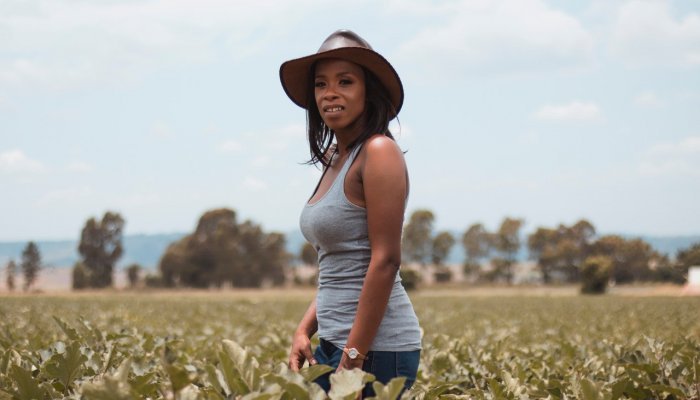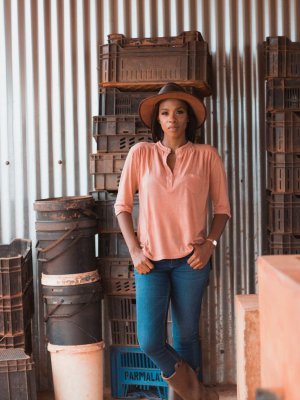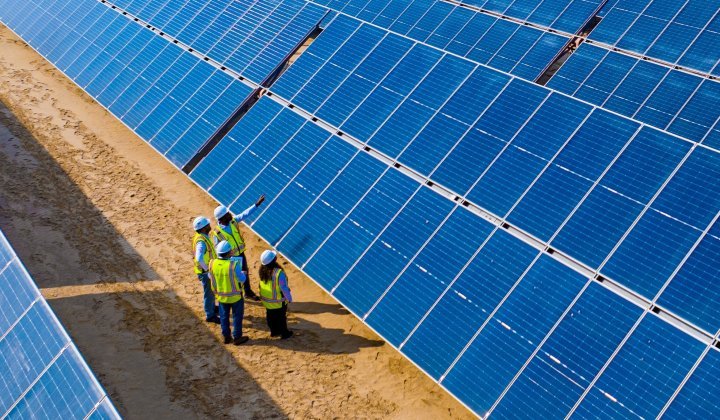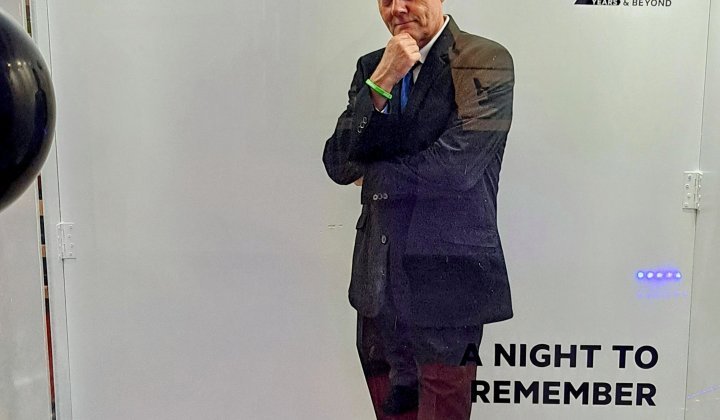Mbali Nwoko’s career shift from recruitment to starting her own agricultural company, Green Terrace, was born out of extensive research into the opportunities available in the agricultural sector. The move has taken unexpected twists and turns over the past five years but continues to offer new challenges and potentialities.
The unusual events of 2020 certainly didn’t allow Nwoko to take her foot off the pedal. Far from it. Having exited her previous farm venture in 2018, she was knee-deep in building a new farm when the lockdown came into force. Trying to raise money was challenging and, with many of her suppliers not regarded as essential services, operations ground to a halt.
“Getting the sort of money to build a new farm has been very difficult,” says Nwoko, who bootstrapped her first farm with the help of family and friends. But her new venture – a two-hectare Bapsfontein-based hydroponic farm with approximately one hectare of tunnels – is a truly commercial production that will focus on producing high-end crops. It is not surprising that it comes with a much higher price tag.
“During 2020, I had three conversations with investors and three proposals were sent my way. I declined all of them because I felt they gave me little room to negotiate,” explains Nwoko. “When you’ve built something of high value, and the only place you are stuck is 10% of the amount you’ve already spent, and you just need that 10% to plant and go – while the venture capitalists want 40% –well, that’s a lot. And they aren’t taking the risk, I am.”
But having graduated from the JP Morgan GIBS Small Business Boost Programme in 2019, Nwoko, who also holds a BCom in Industrial Psychology, is savvy enough to keep an eye on her crops as well as her future strategy. “This isn’t my first rodeo,” she stresses, while admitting that “being self-employed in this country is hard, and even more so when you are trying to raise money.”
A new outlook
The JP Morgan GIBS programme, which falls under the aegis of the GIBS Entrepreneurship Academy, was designed to support and fast-track businesses and entrepreneurs in the green space. The curriculum’s ‘people, planet, profit’ approach sat well with Nwoko’s sustainable vision.
“It was fantastic,” recalls Nwoko. “I’d always wanted to study at GIBS, and now I know why brand GIBS is GIBS because they have phenomenal lecturers and I like the fact that lecturers are also business people. I learnt a great deal.”
The experience broadened her network, her exposure to other industries, and her thinking about the future direction of the world. “I was exposed to terms like a VUCA world – volatile, uncertain, complex and ambiguous – and I was challenged in my thinking around business principles, such as the use of too many contract or permanent workers, and outsourcing machinery, or grouping clients by day or per week in terms of delivery. I got to learn from other entrepreneurs. We were challenged as leaders, as thinkers,” she says.
Shortly after graduating, Nwoko set the wheels in motion for her new hydroponics venture – a vision underscored by business principles, a future-focused outlook and a sustainable ethos.
High-tech beginnings
At the time of writing, Green Terrace had new partners on board, and the high-tech, automated and efficiency-driven farm was raring to begin production.
“Farming is so expensive, so this is the only way to compete and to remain in business,” explains Nwoko. “It’s all about consumer trends. People want safe, good-looking foods at the right times, and the procurement guys want good quality and a consistent basis. So, I need to produce consistently and minimise as much risk as possible. This is the vision for the new farm,” she says, adding, “Holistically, it’s all about new beginnings. I’m excited about it.”
But one thing that won’t change is Nwoko’s passion for sharing her experiences – warts and all – through her blog, podcast and monthly columns in Farmer’s Weekly, which she began writing in early 2019. “I’m not an agri girl, and I wasn’t born from a family of farmers,” stresses Nwoko, explaining the practical nature of her columns.
“My articles are not political or diplomatic; I’m just coming from my reality of being a farmer and sharing what I’ve learnt, from crop rotation to risk analysis. This is all very new to me, so I’m just approaching this as a business and taking the skills from my previous business and applying those to farming,” she explains, adding that Farmer’s Weekly was her go-to guide to teach herself about farming “over and above YouTube and Google”.
Today – along with accolades such as Winner: New Entrepreneur Award 2020 (BBQ Awards) and Top 100 Influential Young South Africans 2020 (Avance Media) – Nwoko is the only woman columnist at Farmer’s Weekly.
“Yes, I have a lot on my plate,” she admits, “but everything is centred around farming. This is a day in my life; I live and breathe this stuff.” And, most importantly, she adds, “I know what I’m talking about.”
The future of farming?
Hydroponics offers a glimpse into a new world of farming and a vision of how we might feed an expanding global population. Drawing on the Greek words ‘hydro’ (water) and ‘ponos’ (labour), hydroponics refers to the practice of growing food in nutrient-rich water rather than soil.
Using hydroponics gives a farmer almost complete control over the process. They can manage the exact nutrient mix, the pH of the water, temperature, light and water use. Labour costs can be reduced, and consistent quality assured. Hydroponic yields, according to the United Nations Food and Agriculture Organisation, are around 20-25% higher than traditional agriculture. However, initial set-up costs are steep, with a capital investment of around US$110,000 (or R1.7 million) required for a base-level system without full automation, according to an August 2020 Markets and Markets research report.
Markets and Markets projects the global hydroponics market will be worth about US$16.6 billion (R259 billion) by 2025, on the back of compound annual growth of around 11.9% since 2020.
The farm that sowed the seed
Mbali Nwoko started her first farming venture in Boksburg, Gauteng, in 2016. It was, in many respects, a baptism of fire. Without the resources to buy land, she started by renting a farm with basic infrastructure from a “gem of a landlady”. But she was still a 28-year-old woman hiring people in their 40s and fighting preconceived notions of what a farmer in South Africa looked, acted and sounded like.
She learnt the hard way about the trials and tribulations of farming, spending R20,000 on seeds only to have a failed harvest, battling the seasons and navigating funding frustrations while still having to deliver to her clients. But she stuck with it and was never too proud to peep over the fence to see what other, more established farmers were up to. “I would drive around during different seasons to see how other farmers were cultivating their land and what techniques I needed to apply,” she recalls.
Her learnings ultimately inspired her to give back by sharing her experiences. “I’m trying to give people more information about farming. Information that wasn’t there when I started,” she explains. “It’s about showing a new way for farmers.”







